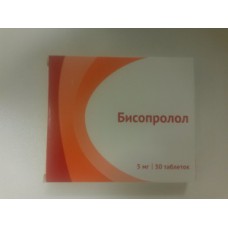Expiration date: 05/2026
Composition
1 tablet contains active substance: bisoprolol fumarate 2.5, 5 or 10 mg
at 30 and 50 tablets
Pharmacotherapeutic group
Beta1-blocker selective
Pharmacological action
Bisoprolol is a selective beta1-blocker without own sympathomimetic activity, has membrane stabilizing effect. As for other beta1-blockers, the mechanism of action in hypertension is unclear. However, it is known that bisoprolol reduces the activity of renin in blood plasma, reduces the need of myocardium in oxygen, slows the heart rate (HR). It has antihypertensive, antiarrhythmic and antianginal effects. Blocking in low doses beta1-adrenergic receptors of the heart, reduces catecholamines stimulated the formation of cyclic adenosine monophosphate (camp) from adenosine triphosphate (ATP), reduces intracellular current of calcium ions, inhibits all the functions of the heart, decreases atrioventricular (AV) conduction and excitability. At higher therapeutic doses has beta2-adrenoblokirtee action. Total peripheral vascular resistance in the early use of beta-blockers in the first 24 h is increased (as a result of reciprocal increase in activity of alpha-adrenergic receptors and eliminate stimulation of beta2-adrenoceptor), through 1-3 day returns to the original, but with prolonged use decreases. The antihypertensive effect associated with a decrease in minute volume of blood, sympathetic stimulation of peripheral vessels, decreased activity of sympathoadrenal system (SAS) (of great importance for patients with baseline hypersecretion of renin), restoring sensitivity in response to reduction of blood pressure (BP) and the influence on the Central nervous system. In arterial hypertension effect occurs in 2-5 days, stable effect - in 1-2 months. therapy.
Antianginal effect is due to reduction of requirement of a myocardium for oxygen by reducing contractility and other functions of the myocardium, lengthening of diastole, improved myocardial perfusion. By increasing end-diastolic pressure in the left ventricle and increase the tension of the muscle fibers of the ventricles can increase oxygen demand, especially in patients with chronic heart failure (CHF).
When used in high therapeutic doses, unlike nonselective beta-blockers, has a less pronounced effect on bodies containing beta2-adrenergic receptors (pancreas, skeletal muscle, smooth muscles of peripheral arteries, bronchi and uterus) and on carbohydrate metabolism, does not cause the delay of sodium ions in the body, the severity of the atherogenic actions is not different from propanolol.
Indications for use
Hypertension, coronary heart disease (prevention of angina attacks), congestive heart failure.
Contraindications
Hypersensitivity to bisoprolol, other components of the drug and other beta-blockers, acute heart failure or chronic heart failure decompensation requiring inotropic therapy, shock (including cardiogenic), pulmonary edema, syndrome of weakness of sinus node, sinoatrial block, atrioventricular block II and III degree, without a pacemaker, bradycardia (heart rate less than 60 BPM), severe hypotension (systolic blood pressure (BP) 100 mm Hg. century), a severe form of asthma and chronic obstructive pulmonary disease (COPD), a history of pheochromocytoma (without the simultaneous use of alpha-blockers), difficult-to-control diabetes, late stage of peripheral circulatory disorders (including Raynaud's syndrome, refractory hypokalemia, hyponatremia, hypercalcemia, metabolic acidosis, concomitant use of monoamine oxidase inhibitors (MAOIS) (with the exception of MAO inhibitors type), the age of 18 years (efficacy and safety have not been established), lactose intolerance, lactase deficiency or glucose-galactose malabsorption.
Method of application and doses
The drug's Bisoprolol is taken orally in the morning on an empty stomach, once daily, with liquid, squeezed small amount of liquid. Tablets should not be chewed or crushed. Treatment of hypertension and angina pectoris In all cases the mode of reception and dose selects the physician for each patient individually, particularly with regard to heart rate and therapeutic response. Hypertension and coronary heart disease the usual starting dose is 5 mg 1 times per day. If necessary, increase the dose to 10 mg 1 time per day. In the treatment of hypertension and angina maximum daily dose is 20 mg 1 time/day. You can split the daily dose into 2 doses. Standard treatment of CHF includes the use of angiotensin converting enzyme inhibitors (ACE) or receptor antagonists of angiotensin II (in case of intolerance to ACE inhibitors). Beta-blockers, diuretics and optional cardiac glycosides. Initiating treatment of CHF with Bisoprolol requires preparation of a mandatory special phase titration and regular medical monitoring. A prerequisite for drug treatment Bisoprolol is stable chronic heart failure without signs of deterioration. The treatment of chronic heart failure drug Bisoprolol begins in accordance with the following scheme of titration. This may require individual adjustment depending on how well the patient takes the prescribed dose, i.e. the dose can be increased only if the previous dose was well tolerated. The recommended initial dose is 1.25 mg (1/2 tablet of 2.5 mg) once a day. Depending on individual tolerance dose can be increased to 2.5 mg, 3.75 mg (1.5 tablets of 2.5 mg), 7.5 mg (3 tablets, 2.5 mg) and 10 mg of 1 times a day. Each subsequent increase in dose should be not less than two weeks. If the increase in dose is poorly tolerated by the patient, may reduce the dose. The maximum recommended dose in CHF is 10 mg Bisoprolol 1 per day. During a titration it is recommended that regular monitoring of blood pressure, heart rate and the severity of symptoms of CHF. Worsening of symptoms of CHF may flow from the first day of treatment. If the patient does not tolerate the maximum recommended dose, it is possible a gradual dose reduction. During the titration phase or after it may cause temporary worsening of CHF, hypotension or bradycardia. In this case it is especially recommended to adjust the dosage of concomitant therapy. You may also need a temporary dose reduction of the drug Bisoprolol or its abolition. After stabilization of the patient's state should re-titration of the dose or continue the treatment.
Release form
Tablet film coated 2.5, 5 or 10 mg of 30 and 50 tablets per pack


